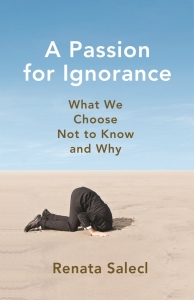“A Passion for Ignorance” and for Denials and Negations with Professor Renata Salecl
Ignorance, denials and negations have always been part of human experience. In this post-truth, post-industrial world, we often feel overwhelmed by the information and misinformation overload. Although we claim to live in an information age, consciously or unconsciously, actively or passively more and more we are choosing to ignore, deny and negate facts and valid opinions. In this episode of Bridging the Gaps, I speak with philosopher and sociologist Professor Renata Salecl and we this discuss this “passion for ignorance”. In her recent book “A Passion for Ignorance: What We Choose Not to Know and Why” Renata Salecl explores how the passion for ignorance plays out in many different aspects of life today.
Renata Salecl is professor at the School of Law at Birkbeck College, University of London and senior researcher at the Institute of Criminology at the Faculty of Law in Ljubljana, Slovenia.
I open our discussion by asking Professor Salecl to unpack and explain various faces of ignorance that she outlines at the start of the book. We discuss the transformation of the knowledge economy to ignorance economy as she reports in the book. This book is organised very well; most chapters in the book start by outlining some kind of ignorance, this could be an active or passive ignorance, conscious or unconscious ignorance, and then Salecl discusses underlying reasons and possible impact of these denials and negations. In this discussion we touch upon a variety of denials and negations and forms of ignorance. We start with an important form of negation which is “choosing to ignore scientific evidence”. We also discuss the emergence of new forms of denials and ignorance in this age of Big Data. Drawing on philosophy, social and psychoanalytic theory, popular culture, and her own experience, Salecl explains that ignorance is a complex phenomenon that can, on occasion, benefit individuals and society as a whole.
Complement this discussion with Professor Justin Smith’s “Irrationality: A History of the Dark Side of Reason”
And then listen to Professor Luciano Floridi’s thoughts on “Philosophy of Information” and “Ethics of Information”


Connect With Us